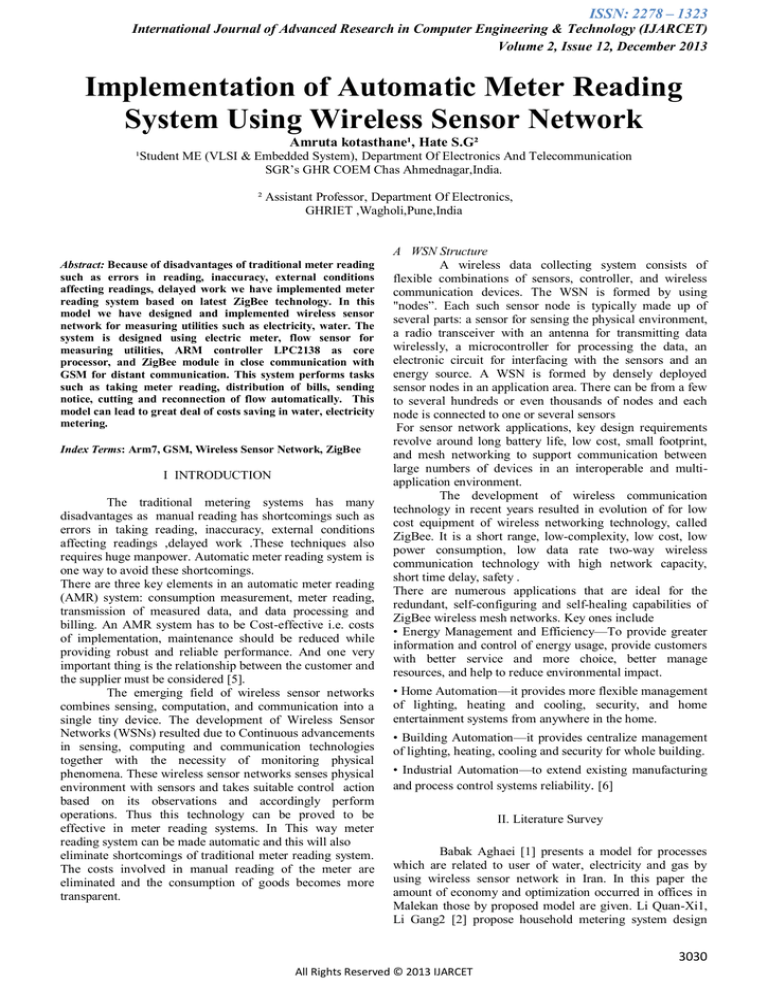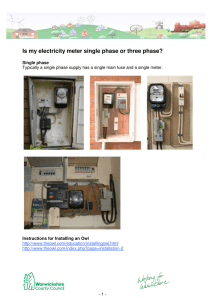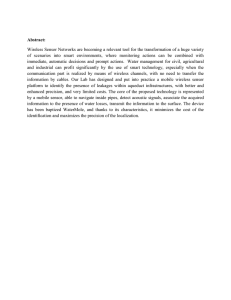
ISSN: 2278 – 1323
International Journal of Advanced Research in Computer Engineering & Technology (IJARCET)
Volume 2, Issue 12, December 2013
Implementation of Automatic Meter Reading
System Using Wireless Sensor Network
Amruta kotasthane¹, Hate S.G²
¹Student ME (VLSI & Embedded System), Department Of Electronics And Telecommunication
SGR’s GHR COEM Chas Ahmednagar,India.
² Assistant Professor, Department Of Electronics,
GHRIET ,Wagholi,Pune,India
Abstract: Because of disadvantages of traditional meter reading
such as errors in reading, inaccuracy, external conditions
affecting readings, delayed work we have implemented meter
reading system based on latest ZigBee technology. In this
model we have designed and implemented wireless sensor
network for measuring utilities such as electricity, water. The
system is designed using electric meter, flow sensor for
measuring utilities, ARM controller LPC2138 as core
processor, and ZigBee module in close communication with
GSM for distant communication. This system performs tasks
such as taking meter reading, distribution of bills, sending
notice, cutting and reconnection of flow automatically. This
model can lead to great deal of costs saving in water, electricity
metering.
Index Terms: Arm7, GSM, Wireless Sensor Network, ZigBee
I INTRODUCTION
The traditional metering systems has many
disadvantages as manual reading has shortcomings such as
errors in taking reading, inaccuracy, external conditions
affecting readings ,delayed work .These techniques also
requires huge manpower. Automatic meter reading system is
one way to avoid these shortcomings.
There are three key elements in an automatic meter reading
(AMR) system: consumption measurement, meter reading,
transmission of measured data, and data processing and
billing. An AMR system has to be Cost-effective i.e. costs
of implementation, maintenance should be reduced while
providing robust and reliable performance. And one very
important thing is the relationship between the customer and
the supplier must be considered [5].
The emerging field of wireless sensor networks
combines sensing, computation, and communication into a
single tiny device. The development of Wireless Sensor
Networks (WSNs) resulted due to Continuous advancements
in sensing, computing and communication technologies
together with the necessity of monitoring physical
phenomena. These wireless sensor networks senses physical
environment with sensors and takes suitable control action
based on its observations and accordingly perform
operations. Thus this technology can be proved to be
effective in meter reading systems. In This way meter
reading system can be made automatic and this will also
eliminate shortcomings of traditional meter reading system.
The costs involved in manual reading of the meter are
eliminated and the consumption of goods becomes more
transparent.
A WSN Structure
A wireless data collecting system consists of
flexible combinations of sensors, controller, and wireless
communication devices. The WSN is formed by using
"nodes”. Each such sensor node is typically made up of
several parts: a sensor for sensing the physical environment,
a radio transceiver with an antenna for transmitting data
wirelessly, a microcontroller for processing the data, an
electronic circuit for interfacing with the sensors and an
energy source. A WSN is formed by densely deployed
sensor nodes in an application area. There can be from a few
to several hundreds or even thousands of nodes and each
node is connected to one or several sensors
For sensor network applications, key design requirements
revolve around long battery life, low cost, small footprint,
and mesh networking to support communication between
large numbers of devices in an interoperable and multiapplication environment.
The development of wireless communication
technology in recent years resulted in evolution of for low
cost equipment of wireless networking technology, called
ZigBee. It is a short range, low-complexity, low cost, low
power consumption, low data rate two-way wireless
communication technology with high network capacity,
short time delay, safety .
There are numerous applications that are ideal for the
redundant, self-configuring and self-healing capabilities of
ZigBee wireless mesh networks. Key ones include
• Energy Management and Efficiency—To provide greater
information and control of energy usage, provide customers
with better service and more choice, better manage
resources, and help to reduce environmental impact.
• Home Automation—it provides more flexible management
of lighting, heating and cooling, security, and home
entertainment systems from anywhere in the home.
• Building Automation—it provides centralize management
of lighting, heating, cooling and security for whole building.
• Industrial Automation—to extend existing manufacturing
and process control systems reliability. [6]
II. Literature Survey
Babak Aghaei [1] presents a model for processes
which are related to user of water, electricity and gas by
using wireless sensor network in Iran. In this paper the
amount of economy and optimization occurred in offices in
Malekan those by proposed model are given. Li Quan-Xi1,
Li Gang2 [2] propose household metering system design
3030
All Rights Reserved © 2013 IJARCET
ISSN: 2278 – 1323
International Journal of Advanced Research in Computer Engineering & Technology (IJARCET)
Volume 2, Issue 12, December 2013
based on Zigbee and GPRS technologies, using
PIC18LF4620 as the core processor and CC2430 chip as
close communication function, using SIM300 chip as
communication function in distance.
Md. Wasi-ur-Rahman, Mohammad Tanvir
Rahman, Tareq Hasan Khan and S.M. Lutful Kabira[3]
proposed technique for remotely reading electricity meter
readings using Short Message Service (SMS) has been
illustrated. Existing Global System for Mobile
communications (GSM) networks have been used for
sending and receiving SMS.
Dr. Mohd Yunus B Nayan1, Aryo Handoko
Primicanta2 [4] propose hybrid Automated Metering
Reading (AMR) system which is a combination of ZigBee
and GSM technology. In this propose system ZigBee
module is attached to the electric meter by using interface
board and the data collector will be connected to the central
computer by using GSM.
Gordan Štruklec1, Vedran Bilas2[5] propose a
wireless automatic water-meter reading system founded on
ZigBee technology . The wireless automatic water-meter
reading system presented here uses ZigBee networking to
avoid difficulties and problems inherent to other meter
reading techniques
In all above models either single parameter is used
for developing AMR i.e. electricity and water or give
general idea about designing of AMR. Designed model
gives detailed design of AMR which will measure electricity
and water and for each house and will forward recorded data
to central station and will also send sms to user using gsm
communication, regarding due dates ,bills etc.
III METHODS
A System Architecture
We designed model which is concerned with main
household utilities that are water, electricity distribution
network. In this designed system, meters used for recording
amount of family's consumption. In this system we have
designed two nodes .As we know wireless sensor network
consists of nodes, one house containing these meters can be
considered as one node. Data i.e. consumption of one house
is transferred to next house by using wireless sensor
network. In this model main office is considered as central
node of a network.
collected in data collecting module through ZigBee network.
Finally all data is sent to central office via gsm
communication for billing and further analysis [1]. GSM
module is also used to broadcast messages of bills of
individual houses, due dates for payments, confirmation of
bill payments etc.
B HARDWARE BLOCK DIAGRAM
User meter reading module consists of three parts,
intelligent instrument data acquisition module, data storage
and data transfer module of ZigBee [2]
The LPC2138 controller is low power, low cost,
high speed device. The LPC21438 microcontrollers are
based on a 32 bit ARM7TDMI-S CPU with real-time
emulation and embedded trace support. It has embedded
high speed flash memory 512 kB. For critical code size
applications, it provides the alternative 16-bit Thumb mode
which reduces code by more than 30 % with minimal
performance penalty. This controller also supports serial
communications interfaces ranging from a USB 2.0 Full
Speed device, multiple UARTS, SPI, SSP to I2Cs and on
chip SRAM of 32 kB. These features make these devices
very well suited for communication gateways and protocol
converters, and also in applications like soft modems, voice
recognition and low end imaging. It also provides 32-bit
timers, single or dual 10-bit ADC(s), 10-bit DAC, PWM
channels and 45 fast GPIO lines with up to nine edges or
level sensitive. [8]
LCD display is connected to microcontroller for
continuously displaying values of water, electricity
consumed. Microcontroller is also connected to the relay
driver and relay which cuts and resumes supply if bill
payment is not done. This makes system automatic
The wireless communication among devices is
achieved using XBee modules. The XBee OEM RF
Modules designed to meet IEEE 802.15.4 standards and
supporting the unique needs of low-cost, low-power
wireless sensor networks are used for RF transmission. The
modules require minimal power and provide reliable
delivery of data between devices. This module has
specifications of Indoor/Urban range up to 100’ (30 m)
,Outdoor line-of-sight: up to 300’ (100 m),Transmit Power:
1 mW (0 dBm) and Receiver sensitivity: -92 dBm[7]
16*2 LCD
display
First house
Energy
& water
meter
gsm
Gate way node central station
Energy
meter
ZigBee
module
Energy
& water
meter
ARM 7 controllers
Second house
Fig 1.System Architecture
As shown in figure above, this model works such as one
house sends its data to next house i.e. one node sends its
data to neighboring node. This node then sends its data
along with data of previous house to further node and
process continues. Data gathered from every node is
Water
meter
LPC2138
Relay
and
driver
GSM
module
Fig 2.Hardware Block Diagram
3031
All Rights Reserved © 2013 IJARCET
ISSN: 2278 – 1323
International Journal of Advanced Research in Computer Engineering & Technology (IJARCET)
Volume 2, Issue 12, December 2013
IV EXPERIMENT RESULTS
In this section, we demonstrated the experimental results of
the proposed system. The monitoring and management
interface of the wireless automatic meter reading system in
this research is shown in Fig. 4. It is coded with the Visual
Basic Program language developed by Microsoft. At this
central station, it receives multifunction electric meter data,
and water meter data i.e. energy and water consumption.
During experiment two houses were selected and the load
was connected to demonstrate the working of model. An
electric meter, measures amount of energy consumed by one
house, while water meter measures amount of water
consumed and transfers this measured data to next house
using XBee .This data is then send to PC via RS 232
communication format. The fig 3.shows the designed model
used for experiment.
Fig 3. Node Designed For Experiment
XBee in WSN makes this system low cost, less power
consuming, secure and reliable. This system can not only
reduce the shortcomings of traditional metering system but
will also reduce manpower required.
REFERENCES
[1] Babak Aghaei, Using Wireless Sensor Network in Water, Electricity
and Gas industry, 978-1-4244-8679-3/11/$26.00 ©2011 IEEE
[2] Design of remote automatic meter reading system based on ZigBee and
GPRS,by Li Quan-Xi1, Li Gang2, ISBN 978-952-5726-10-Proceedings of
the Third International Symposium on Computer Science and
Computational Technology(ISCSCT ’10)Jiaozuo, P. R. China, 1415,August 2010, pp. 186-189
[3] Md. Wasi-ur-Rahman, Mohammad Tanvir Rahman, Tareq Hasan Khan
and S.M. Lutful Kabira, Design of an Intelligent SMS based
Remote Metering System. Proceedings of the 2009 IEEE International
Conference on Information and Automation June 22 -25, 2009,
Zhuhai/Macau, China
[4] Dr. Mohd Yunus B Nayan1, Aryo Handoko Primicanta2, Hybrid
System Automatic Meter Reading.
[5] Gordan Štruklec1, Vedran Bilas2, Wireless Automatic Water-meter
Reading System
[6] Getting Started with ZigBee and IEEE 802.15.4, Copyright © 2004–
2010, Daintree Networks Inc All rights reserved
[7] XBee™/XBee-PRO™ OEM RF Modules, Product Manual v1.xAx 802.15.4 Protocol For OEM RF Module Part Numbers: XB24-...-001,
XBP24-...-001
[8]LPC2131/32/34/36/38
Single-chip
16/32-bit
microcontrollers;
32/64/128/256/512 kB ISP/IAP flash with 10-bit ADC and DAC Rev. 03
— 21 September 2006 Product data sheet
Amruta Kotasthane Student ME (VLSI & Embedded System),
Department Of Electronics And Telecommunication, SGR’s GHR COEM
Chas Ahmednagar, India
Hate S.G² ² Assistant Professor, Department Of Electronics,
GHRIET, Wagholi, Pune, India
Fig4: Monitoring and management of wireless automatic meter
reading system at central station
V CONCLUSION
Automatic meter reading system model presented in this
paper uses WSNs for main household utilities which are
related to user of water and electricity. This process includes
taking meter reading, distribution of bills and sending notice
about due dates via sms, cutting and reconnection of flow.
By study of WSN this automatic meter reading system was
designed by using XBee as communication medium. Use of
3032
All Rights Reserved © 2013 IJARCET



